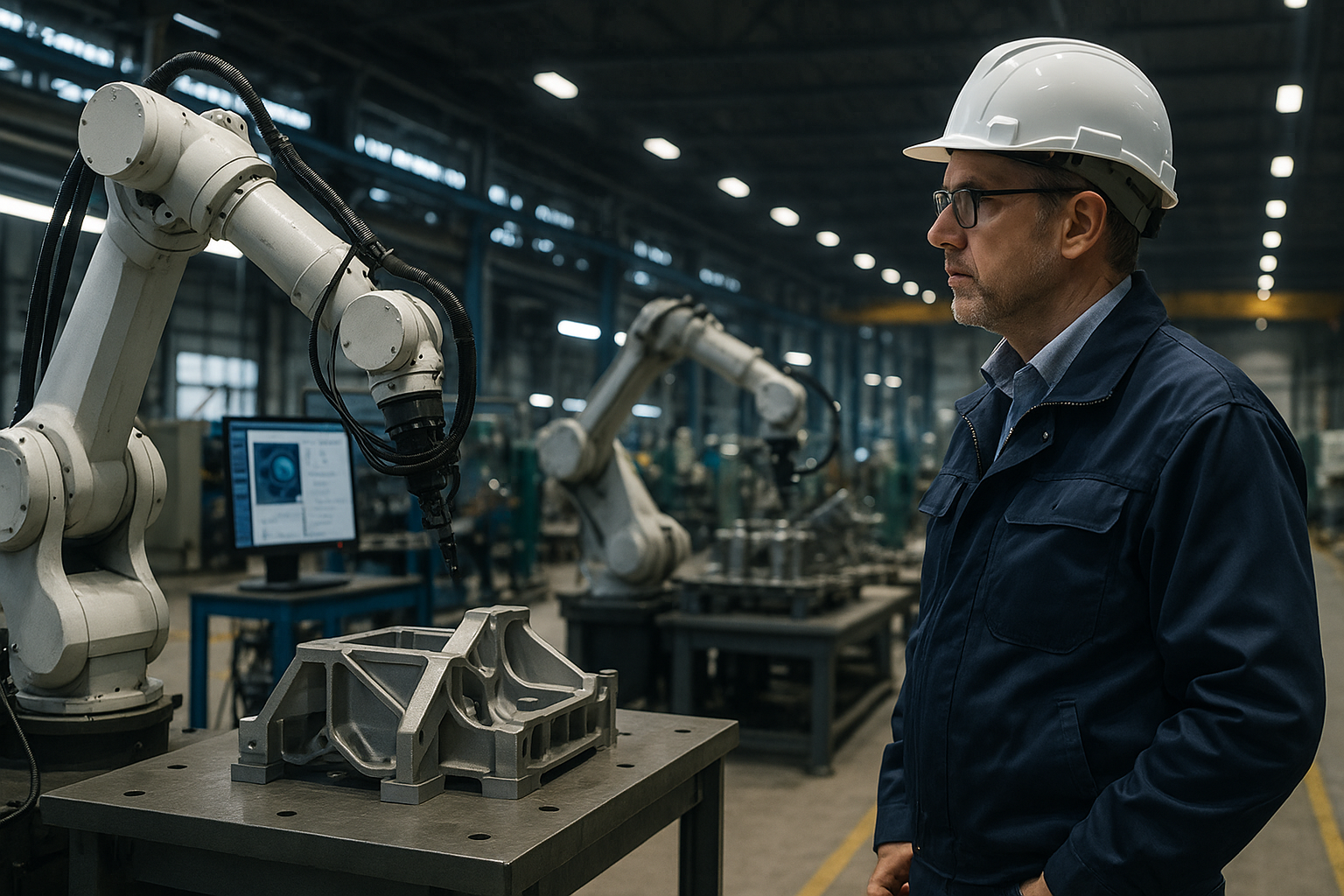For decades, Britain’s manufacturing sector has been shrinking — not only in output, but in national imagination. Once the workshop of the world, the UK now derives less than 10% of its GDP from manufacturing, a sharp decline from the nearly 25% seen in the 1970s. Mines have closed, steel mills have downsized, and entire industrial towns have struggled to reinvent themselves as service-based economies.
But a surprising shift is underway. Across the UK — from the Midlands to Teesside, from Wales to the Scottish central belt — a new wave of investment is flowing into high-tech manufacturing. Fueled by automation, robotics, AI-driven production, and clean-energy technologies, Britain may be on the cusp of an industrial renaissance.
The question is whether technology alone can overcome decades of underinvestment, rising energy costs, supply-chain disruption and global competition — or whether the manufacturing comeback will remain limited to a handful of advanced sectors.
A Sector at a Crossroads
The post-pandemic global economy exposed vulnerabilities in long, fragile supply chains. Shipping chaos, semiconductor shortages, and geopolitical tensions forced countries to rethink their industrial autonomy. Britain, heavily dependent on imports for critical goods, was no exception.
These disruptions triggered a renewed focus on “reshoring” — bringing manufacturing back to domestic soil. UK policymakers now argue that having stronger domestic capabilities in strategic sectors is essential for national security, economic resilience, and technological leadership.
“Britain cannot be competitive globally if it doesn’t make anything,” says Dr. Oliver Kent, professor of industrial strategy at Warwick Manufacturing Group. “Technology gives us another chance — but it must be seized with urgency and ambition.”
Where the Growth Is Happening
The UK’s manufacturing revival isn’t happening in traditional heavy industries. Instead, it is led by specialised, high-value, technology-driven sectors:
1. Electric Vehicles (EVs) and Batteries
The auto industry, once in decline, is seeing a resurgence thanks to electrification.
-
Nissan is expanding EV production in Sunderland.
-
Jaguar Land Rover (JLR) is investing £4 billion in a gigafactory in Somerset.
-
Startup Arrival continues to innovate in modular EVs, despite financial struggles.
These projects aim to secure Britain’s place in the EV supply chain — but success hinges on building large-scale battery capacity.
2. Aerospace and Advanced Aviation
Airbus, Rolls-Royce, and smaller aerospace firms are leading research into hydrogen and electric propulsion, lightweight composite materials, and next-generation engines.
Rolls-Royce’s small modular reactor (SMR) programme also positions the UK as a potential global leader in next-gen nuclear.
3. Pharmaceuticals and Life Sciences
The Oxford-Cambridge “arc” remains one of the world’s strongest biotech clusters.
-
mRNA vaccine R&D
-
biotech manufacturing expansion
-
advanced therapeutics
But industry leaders warn that better financing and faster regulatory approvals are needed.
4. Robotics and Automation
Factories across the Midlands and North are modernising with Industry 4.0 technologies:
-
autonomous mobile robots
-
computer-vision quality control
-
predictive AI maintenance
-
3D-printed components
These innovations reduce labour costs, boost speed, and enable small UK factories to compete against mega-plants abroad.
5. Green Manufacturing
Clean-energy engineering is booming:
-
offshore wind turbine components
-
heat pump assembly
-
carbon capture modules
-
hydrogen storage
Teesside and Humber are emerging as global clean-energy hubs.
Technology: The Great Equaliser — or the Final Divider?
British factories lag behind Germany and Japan in robotics density — but that gap is quickly narrowing. Investment in automation is rising as businesses face worker shortages, wage pressure, and rising competition.
“Robotics isn’t replacing workers; it’s replacing unproductive processes,” argues Rachel Faulkner, head of automation at a Midlands engineering firm. “The companies adopting early are seeing productivity soar.”
Still, adoption varies dramatically. Large manufacturers move quickly. Smaller firms — which make up 90% of UK manufacturing — struggle with:
-
high upfront machinery costs
-
limited digital skills
-
outdated facilities
-
scarce automation engineers
Without targeted support, the digital divide in manufacturing could widen.
Can Technology Bring Jobs Back?
The political argument for reshoring often centres on jobs. But modern manufacturing is not the labour-intensive sector of the past. It is capital-intensive, skilled, and highly automated.
New factories typically create fewer but higher-paying jobs:
-
robotics technicians
-
data analysts
-
automation engineers
-
AI-enabled production managers
The challenge? Britain faces a chronic shortage of technical workers. Nearly 60% of manufacturers report difficulty hiring digital and engineering skills.
“Infrastructure and investment matter — but skills will make or break the renaissance,” says Kent.
Energy Costs: The Ever-Present Threat
Technology is not Britain’s only hurdle. Energy prices remain a key competitive disadvantage.
UK industrial electricity costs are significantly higher than those in France or the U.S., weakening Britain’s appeal as a manufacturing base. Several aluminium, steel, and ceramics plants have already scaled back production due to energy costs.
While renewable capacity is growing, transmission bottlenecks and grid connection delays slow progress. Without affordable, reliable energy, advanced manufacturing will struggle to scale.
Government Strategy: Ambitious but Uneven
The UK government has launched several initiatives to revive industry:
-
Advanced Manufacturing Plan (2024)
-
Green Industries Growth Accelerator
-
tax breaks for capital investment
-
expanded R&D tax credits
-
the UK Infrastructure Bank supporting factory financing
-
partnerships with universities on automation and AI
However, critics say the strategy remains fragmented, with too many pilot projects and not enough large-scale commitments.
“Industrial policy can’t change every two years,” argues Charlotte Mills, CEO of the British Manufacturers Forum. “Manufacturers invest on 20-year timelines.”
Regional Renaissance: New Hubs of Innovation
The UK’s manufacturing revival is not evenly spread — but several regions are emerging as industrial powerhouses:
-
Sunderland and the North East: EV production, battery tech
-
Coventry and Warwickshire: automotive R&D, robotics
-
Teesside and Humber: hydrogen, carbon capture, green steel
-
Bristol and South Wales: semiconductors, aerospace
-
Sheffield: advanced metals and materials engineering
These regions are attracting foreign investment, creating clusters that combine universities, suppliers, startups, and major manufacturers.
Clusters matter — they create ecosystems where talent, ideas, and supply chains reinforce each other.
The Post-Brexit Question
Brexit reshaped the UK’s trade environment. For manufacturers, the impact has been mixed:
Advantages:
-
more flexibility in industrial policy
-
freedom to design UK-specific subsidies
-
renewed focus on domestic supply chains
Disadvantages:
-
increased trade friction with the EU
-
logistical delays
-
reduced access to European labour
For some sectors — particularly automotive — EU market access remains essential. Negotiations on regulatory alignment will influence Britain’s manufacturing competitiveness for years to come.
Will Britain Really Reindustrialise?
Britain is unlikely to return to the heavy manufacturing dominance of the 20th century — nor should it. The future is high-tech, low-carbon, specialised manufacturing that builds on the UK’s strengths:
-
science
-
innovation
-
finance
-
advanced engineering
-
creative design
If Britain leans into these advantages, the manufacturing renaissance could be real, long-lasting, and economically transformative.
But success requires three non-negotiables:
-
Stable industrial policy
-
Massive investment in skills and automation
-
Affordable, clean energy at scale
Without these foundations, the renaissance risks stalling before it ever begins.
A New Industrial Revolution — If Britain Wants It
Technology has given Britain a rare second chance to rebuild its industrial base. Factories today are not smokestacks and assembly lines — they are clean, digital, and autonomous. They require software as much as steel, algorithms as much as machinery.
Whether this becomes a national transformation or a collection of isolated success stories depends on choices made now.
If Britain commits to long-term strategy, invests in people and innovation, and embraces advanced manufacturing with the seriousness it deserves, it can write a new industrial chapter — one defined not by nostalgia, but by competitiveness, resilience, and technological excellence.
700 701 702 703 704 705 706 707 708 709 710 711 712 713 714 715 716 717 718 719 720 721 722 723 724 725 726 727 728 729 730 731 732 733 734 735 736 737 738 739 740 741 742 743 744 745 746 747 748 749 750 751 752 753 754 755 756 757 758 759 760 761 762 763 764 765 766 767 768 769 770 771 772 773 774 775 776 777 778 779 780 781 782 783 784 785 786 787 788 789 790 791 792 793 794 795 796 797 798 799 800 801 802 803 804 805 806 807 808 809 810 811 812 813 814 815 816 817 818 819 820 821 822



